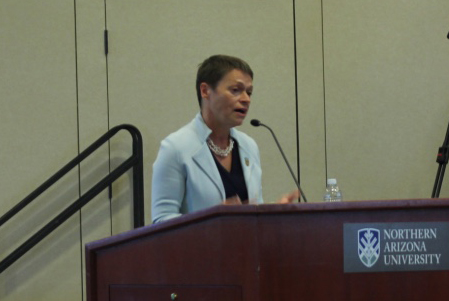Northern Arizona University’s performance is inseparable from student success, president Rita Cheng told the Arizona Board of Regents on Thursday at their meeting in Flagstaff.
On both fronts, Cheng said, trends point up and the outlook is excellent, although unresolved issues with state funding pose ongoing challenges.
“One of the most fulfilling aspects of being a high-performing university is knowing we serve our students well,” Cheng said. “Their success is more than a goal—it’s a value, along with access, quality and the excellence of their experience.”
Cheng developed her remarks around the theme of student success as she updated the regents on NAU’s overall performance since a comprehensive presentation in the spring.
Regents President Eileen Klein opened the two-day meeting with a focus on students.
“Student success is integral to our goals as a university system,” Klein said. But student readiness for higher education in Arizona raises serious questions, she added.
“The sad truth is that fewer than half of Arizona students are qualified to enter our universities,” Klein said. “It’s a big concern for the economy if students can’t find a way to increase their opportunities.”
Klein covered a number of steps the universities and regents are taking to move the number of qualified Arizona students upward.
“We want to set a goal of college-going as an aspiration for our students,” Klein said.
|
During the NAU presentation, Cheng pointed to numerous examples of streamlining, integrated processes and new technology that have advanced the university’s ability to accommodate record numbers of students while improving and expanding services. She cited a recent grant from EDUCAUSE as a culmination of integrated planning and advising.
“Now we will be able to facilitate student success and possible interventions more effectively,” Cheng said. “Sharing information across academic and student affairs functions will allow us to have the most up-to-date, 360-degree view of a student.”
That work, and a host of initiatives focused on the first-year student experience, is producing results. NAU retains nearly 75 percent of its freshman students, and about 79 percent of the 2008 class have either graduated from NAU or another institution, or are still enrolled in college.
“More than 27 percent of our undergraduates go onto graduate and professional schools immediately following graduation, which speaks not only to the quality of our undergraduate programs but also to the values of life-long learning we are instilling in our students,” Cheng said.
Cheng also reviewed obstacles to ongoing success, such as the strain on campus resources from increasing numbers of students and the continued uncertainty of the state’s relationships with its universities.
“We have deferred spending, left open positions unfilled, cut back in a number of areas and increased the size of some sections in academic programs,” Cheng said. “These are real actions with real consequences.”
Cheng reminded the audience that as a result of the most recent state budget, NAU absorbed the largest cut as a percentage of overall revenue of the three regents’ institutions. She said the university is still processing $4 million in cuts this fiscal year while remaining committed to a balanced budget.



